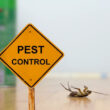In the quest to defend your garden from harmful insect pests, many gardeners go overboard with their pest control strategy. To make things worse, most don’t realize their mistake!
This guide will teach you about the need for restraint when it comes to your garden pest control strategy. Understanding this is crucial.
Table of contents
Why It’s Easy To Go Overboard
When it comes to getting rid of insect pests in your garden, there’s a trap that’s very easy to fall into. It’s the trap of killing everything.
You get fed up with bugs picking away at your plants, fruits, and veggies that you’ve worked so hard on. Because of this, you decide it’s time to take action and get serious about insect-related pest control and protect your garden. This leads you to nuke everything.
It’s an easy trap to fall into for a couple of reasons. Emotionally, you’re more likely to go overboard when you’re frustrated. But tactically, only getting rid of the bugs that frustrate you is actually trickier than it seems. You need to be thoughtful with your approach instead of just coating everything with pesticides.
While it’s easier in the short term, the long term results will not be what you want. You need to view your garden as an ecosystem, and one size fits all strategies will never work if you want it to stay healthy and thrive.
The Reason You Don’t Want This
As we hinted at above, going overboard when it comes to insect pest control is a problem because it removes biodiversity from the garden (which your plants need to thrive). You see, there are good bugs that you want in your garden because they will protect your plants and also aid via pollination.
A totally “clean” and sterile garden environment isn’t what you’re after. You want a lively garden that has as few bad bugs as possible.
This article won’t go into the exact specifics on how you should accomplish this. That’s for another time. Instead, this is meant to help reframe how people view the insects in their garden (so they can get the results they actually want).
If you’ve found yourself going overboard when it comes to getting rid of insects in your garden, it’s time to adjust your approach. You want to use a scalpel when it comes to removal, not a shotgun (not literally of course).
Some Insects You’ll Want To Keep Around
To help you, here’s an example of some of the good insects you’ll want to avoid killing. This will be an opportunity to identify your allies in the quest for a healthy garden and give you a better understanding of their benefits.
Ladybugs
Ladybugs are much more than pretty little insects, they’re a friend to your garden! These little critters will do a tremendous job of eating whiteflies, aphids, and potato beetles, so you don’t want to kill them off.
You can encourage them to spend time in your garden if you have dill, dandelions, and basket of gold. It doesn’t take much to attract them! The nice thing about these bugs is that it’s also easy to tell if you’re doing a good job attracting them to your garden. They’re quite hard to miss.
Ground Beetles
These simple little bugs are often mistaken for harmful pests, but they’re actually quite helpful! These insects are especially helpful if you have slugs or caterpillars that have been wreaking havoc on your garden (they’re actually one of our favorite solutions for those). If you plant some amaranthus or clover in your garden it won’t take long before ground beetles are visiting.
Green Lacewings
Green lacewings are tremendous plant protectors. They’ll happily scarf down aphids, mealybugs, whiteflies, and leafhoppers. If you have some of these insects in your garden, a team of green lacewings will make short work of them. All it takes to attract these bugs into your garden is some dill, coriander, gold marguerite, or angelica (or a combination of all three). These are bugs that you don’t want to kill!
Aphid Midges
Many newer gardeners don’t know much about aphid midges, but there’s a lot to like. These little bugs will eat aphids pretty much exclusively, making them a perfect choice for anyone with an aphid problem (which isn’t uncommon). These insects respond well to dill and any plants that have lots of pollen. If you’re into big flowering plants there’s a good chance you have some aphid midges in your garden already.
Braconid Wasps
Draconis wasps are another helpful bug that you don’t want to kill off by accident. They’ll help you with aphids as well as a variety of caterpillars. Their size makes them a very capable garden defender. Another great thing about braconid wasps is that they’re attracted to some plants that the other bugs on our list aren’t. Parsley, common yarrow, lemon balm, and fern-leaf yarrow are all great ways to encourage these wasps to visit your garden.
Side note: We find these bugs rather fun to observe. They exhibit some interesting behaviors and also have some neat colors!
Conclusion
Now that you know a bit more about why hitting the big red button is not the right strategy when it comes to garden pest control, it’s time for you to adjust your strategy (if necessary). If you truly want a healthy garden full of thriving pants you need to have some beneficial insects around. Expecting stellar results with no insect life just isn’t a viable strategy!
We hope you found this article helpful and feel inspired to take a look at the state of the insects in your garden. If you come up with any questions during the process, feel free to send them our way.

